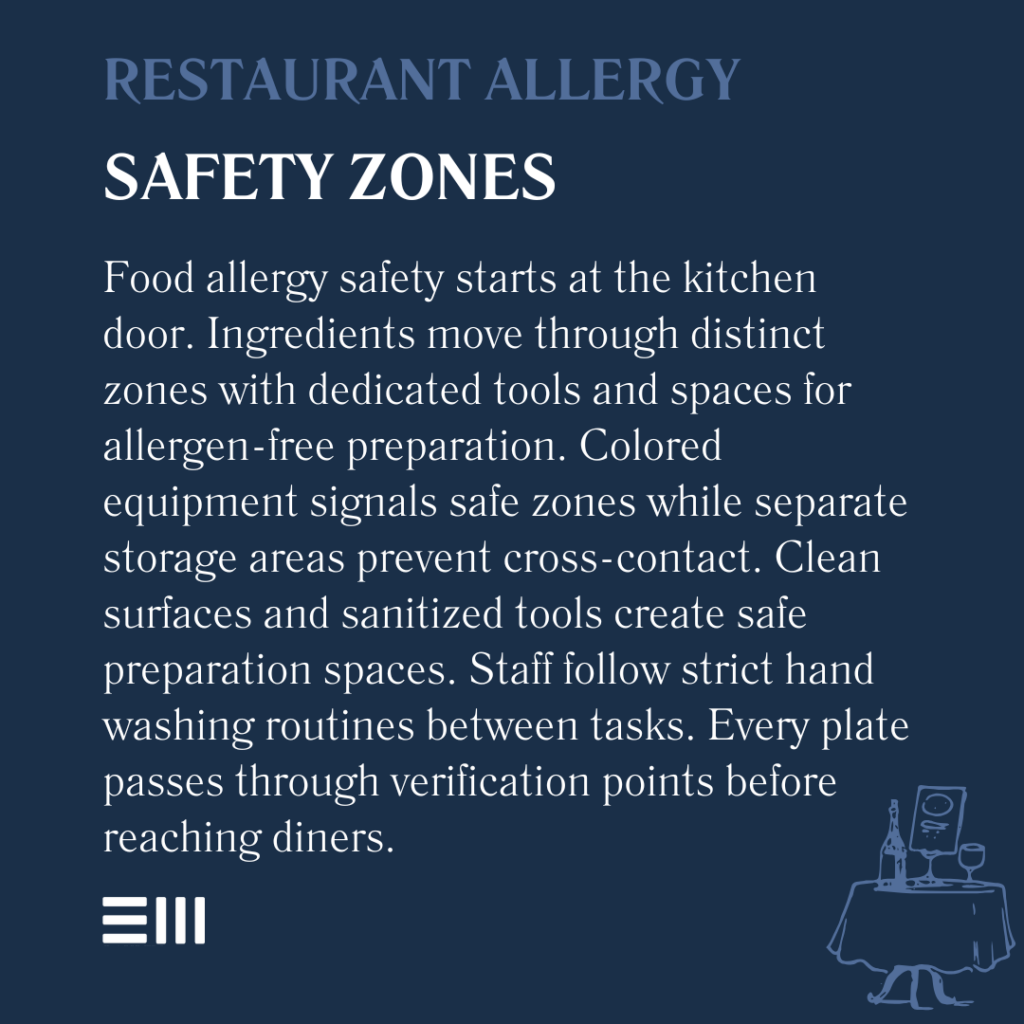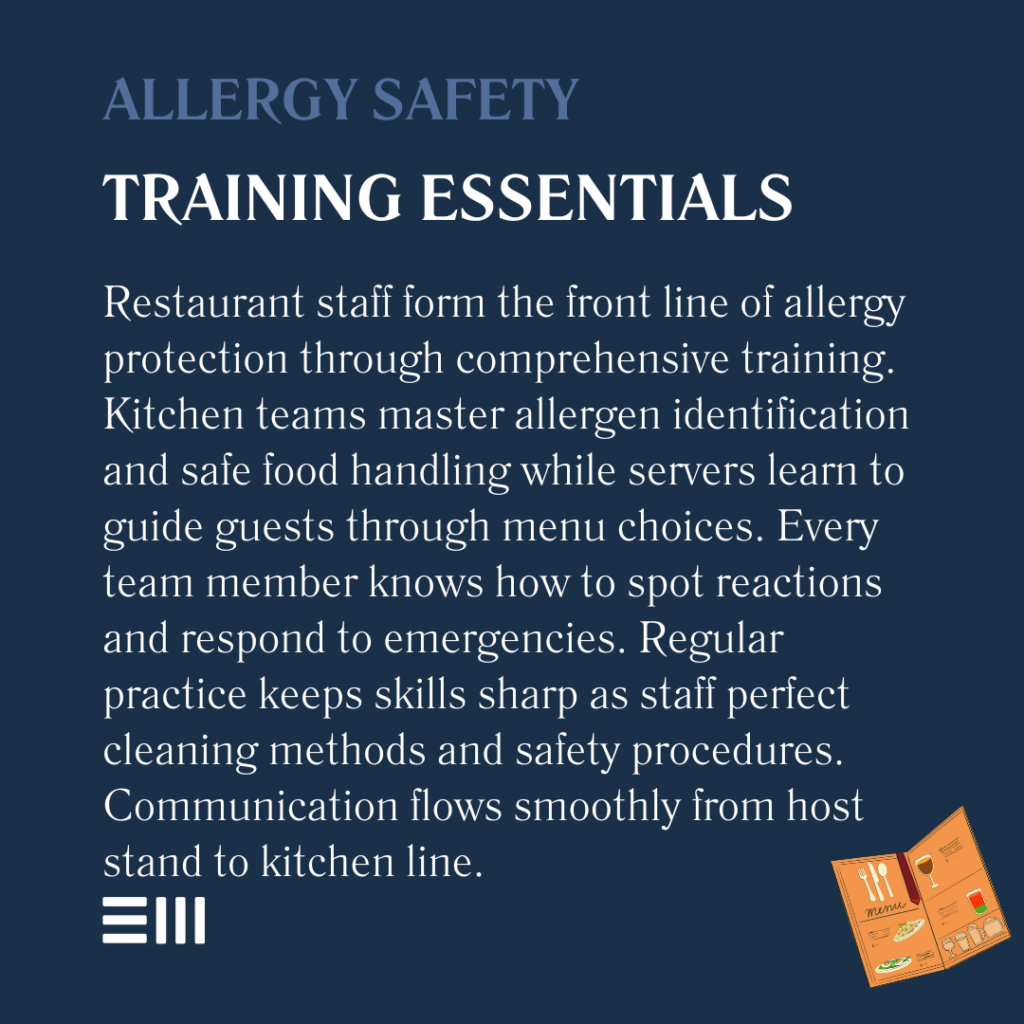
Behind every menu item in a restaurant lies an invisible chain of responsibility. For diners with food allergies, each bite represents an act of trust between customer and establishment—trust that ingredients have been carefully tracked, surfaces properly cleaned, and staff adequately trained.
For the 32 million Americans with food allergies, dining out isn’t just a pleasure—it’s an act of trust. Every menu item, every ingredient, and every kitchen protocol shapes the boundary between an enjoyable meal and a life-threatening emergency.
When this trust breaks down, the consequences can be life-altering, transforming a simple meal into a medical emergency.
Understanding Restaurant Legal Obligations
Restaurant liability for food allergies encompasses a complex web of responsibilities that touch every aspect of food service operations.
From the moment ingredients enter the kitchen to the final presentation at the table, establishments must maintain vigilant oversight of their allergy management processes.
Kitchen Management:
- Comprehensive ingredient tracking systems for all food items;
- Verified supplier documentation for all raw materials;
- Regular updates to recipe databases and ingredient lists;
- Systematic checks of incoming deliveries;
- Proper storage protocols to prevent cross-contact;
- Documentation of ingredient substitutions;
- Quality control measures for prepared items; and
- Verification procedures for special dietary requests.
Service Protocols:
- Clear communication channels between front and back of house;
- Written procedures for handling allergy-specific orders;
- Detailed documentation of customer requests;
- Regular menu reviews and updates;
- Staff training on ingredient communication;
- Emergency response procedures;
- Customer notification systems; and
- Quality assurance checkpoints.
These legal obligations create a framework for protecting both customers and establishments, forming the foundation of a restaurant’s duty of care.
Standard of Care Requirements
The restaurant industry’s approach to food allergy management has evolved to encompass comprehensive safety systems that extend beyond basic food handling.
Modern duty of care standards reflect the complexity of managing food allergies in commercial kitchens.
Physical Layout Requirements:
- Designated allergen-free preparation zones;
- Separate storage areas for common allergens;
- Color-coded equipment and utensils;
- Dedicated hand washing stations;
- Protected food preparation surfaces;
- Appropriate ventilation systems;
- Distinct plating areas; and
- Allergen-specific cleaning supplies.
Operational Standards:
- Written food safety protocols;
- Cross-contamination prevention procedures;
- Regular equipment maintenance schedules;
- Staff certification requirements;
- Emergency response plans;
- Quality control checkpoints;
- Documentation systems; and
- Regular safety audits.
These standards represent the minimum requirements for meeting a restaurant’s duty of care obligations.
Prevention and Safety Protocols
Effective allergy prevention in restaurants demands a multi-layered approach that addresses every potential point of exposure. A comprehensive prevention strategy incorporates both physical safeguards and procedural controls.
Kitchen Safety Measures:
- Ingredient isolation protocols;
- Detailed cleaning procedures;
- Equipment sanitization standards;
- Storage segregation requirements;
- Food preparation sequences;
- Quality control checkpoints;
- Container labeling systems; and
- Surface testing procedures.
Service Safety Procedures:
- Order verification processes;
- Table preparation protocols;
- Serving sequence guidelines;
- Customer communication standards;
- Emergency response procedures;
- Documentation requirements;
- Staff coordination protocols; and
- Quality assurance checks.
Implementation of these protocols creates multiple barriers against allergic incidents while maintaining operational efficiency.

Staff Training Requirements
Professional food allergy training creates the human foundation for effective allergy management. Comprehensive staff education ensures consistent application of safety protocols throughout the establishment.
Core Training Components:
- Allergen identification fundamentals;
- Cross-contact prevention methods;
- Emergency response protocols;
- Customer service guidelines;
- Documentation procedures;
- Cleaning and sanitization;
- Quality control processes; and
- Communication standards.
Advanced Training Elements:
- Ingredient substitution protocols;
- Menu modification procedures;
- Supplier verification methods;
- Equipment maintenance standards;
- Storage rotation requirements;
- Temperature control guidelines;
- Chemical safety procedures; and
- Waste management protocols.
Continuous education ensures staff maintain current knowledge while developing advanced skills in allergy management.

Legal Documentation and Evidence
Proper documentation serves both as a preventive tool and legal protection, creating a clear record of an establishment’s commitment to allergy safety.
Required Documentation:
- Staff training certifications;
- Ingredient verification records;
- Cleaning procedure logs;
- Customer notification forms;
- Incident response reports;
- Equipment maintenance records;
- Supplier verification documents; and
- Safety audit results.
Daily Operations Records:
- Temperature monitoring logs;
- Cleaning verification sheets;
- Staff assignment records;
- Special request documentation;
- Quality control checklists;
- Customer communication logs;
- Equipment inspection reports; and
- Ingredient tracking sheets.
These records demonstrate ongoing compliance while providing crucial evidence of due diligence.
Frequently Asked Questions About Food Allergy Liability
Understanding food allergy liability involves navigating complex legal and operational requirements.
These answers address common concerns from both establishments and affected customers.
What Rights and Protections Exist for Allergic Diners?
Federal and state laws require restaurants to provide reasonable accommodations for customers with food allergies, including accurate ingredient information and safe preparation methods.
When Does Restaurant Liability Apply?
Liability typically arises when establishments fail to meet their duty of care through inadequate protocols, improper training, or negligent food handling.
How Should Restaurants Manage Allergy Information?
Establishments must maintain current ingredient lists, implement clear communication protocols, and establish documented procedures for handling allergy-specific orders.
What Compensation Is Available in Allergy Cases?
Available compensation may include coverage for medical expenses, lost income, ongoing care needs, and other damages related to the incident.
How Does the Legal Process Work?
The process typically involves documenting the incident, gathering evidence of negligence, establishing causation, and demonstrating damages through medical records and expert testimony.
What Steps Should Be Taken After an Incident?
Immediate medical attention, documentation of the incident, preservation of evidence, and prompt legal consultation help protect both health and legal rights.
How Do Restaurants Demonstrate Due Diligence?
Establishments demonstrate due diligence through documented training programs, consistent safety protocols, regular audits, and proper incident response procedures.
Get Expert Legal Support
When food allergy incidents occur, having experienced legal guidance helps navigate the complex intersection of medical evidence and liability law.
Our team brings extensive experience in food service liability cases, working with medical experts, industry specialists, and investigators to build comprehensive cases for our clients.
We understand the profound impact that food allergy incidents can have on individuals and families. Our approach combines thorough legal analysis with compassionate client support, ensuring you have the resources and representation needed to pursue fair compensation.
Contact us today for a confidential consultation about your food allergy case. Our experienced team will help you understand your rights and options while developing a strategic approach to your claim.
Can't find what you're looking for? Search our site below.










